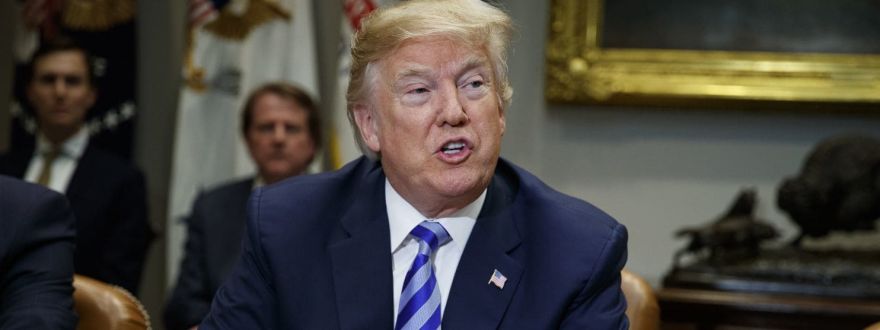
Business Trump promises to ‘derail the gravy train’ and lower drug prices in ‘American Patients First’ plan By Carolyn Johnson May 11
President Trump promised to “derail the gravy train” in the health-care system Friday afternoon, in a Rose Garden speech in which he unveiled his much-anticipated strategy to lower drug prices. The 44-page blueprint, called “American Patients First,” proposes a laundry list of policy ideas — but no specific timeline for implementation. It also excludes an idea that Trump has championed in the past and that was most feared by the industry: allowing the government to negotiate drug prices on behalf of the Medicare program. Instead, the Trump plan includes changes to Medicare that could lower out-of-pocket costs for some seniors, a suggestion that drugmakers disclose their list prices in television ads and a discussion about reforming the system of secret rebates negotiated off drugs’ list prices. In a major departure from his early and harsh criticism of pharmaceutical companies, Trump lashed into the entire supply chain that lies between drugmakers and patients, including health insurers, distributors and the little-known industry that negotiates drug prices. “We’re very much eliminating the middlemen. The middlemen became very, very rich, right?” Trump said. “Whoever those middlemen were — a lot of people never even figured it out — they’re rich. They won’t be so rich anymore.” Trump has criticized drug companies for having too much power and said Friday that the industry lobby “is making an absolute fortune at the expense of American consumers.” Health-care companies across the drug supply chain had been nervous in the run-up to Trump’s speech, with stocks dipping as he began his remarks before ending higher at the close of trading. The proposals were “somewhat gentler than many feared. We feel that healthcare supply chain stocks, in general, should rally on this outcome,” wrote Eric Coldwell, a senior research analyst at the financial services firm Robert W. Baird & Co. Health and Human Services Secretary Alex Azar acknowledged that there was no quick fix for high drug prices. “It’s going to be months for the kind of actions that we need to take here. Again, this is — it took decades to erect this very complex, interwoven system,” Azar said at a White House briefing. “We’re talking about entrenched market players, complex financial arrangements that have — would have to be redesigned.” Trump’s speech Friday embraced some ideas that the powerful pharmaceutical lobby has been seeding and spreading. Over the past year, drug companies have sought to deflect criticism of their prices by blaming a secretive tier of middleman industries, such as pharmacy benefit managers that negotiate drug prices, for the role they play in prices. “Obviously, very, very positive to pharma. Essentially, we are not seeing anything about that speech which should concern investors,” Ronny Gal, an analyst at Sanford C. Bernstein, said in a video message to investors. The pharmaceutical industry would also benefit from one part of the plan: to force other wealthy countries to pay more for drugs. “I haven’t seen so far any manufacturers stepping forward to say how much they would lower prices in the U.S. if the U.K. and Germany paid more,” said Allan Coukell, senior director of health programs at the Pew Charitable Trusts. Trump touted the plan as the “most sweeping action in history to lower the price of prescription drugs.” But health policy specialists said that although there were some sensible ideas in the blueprint, it fell short of that promise. “With all the buildup the administration has given it, the president’s speech was deeply underwhelming. There is very little new in the administration’s plan, and little if anything that will make a difference in the near future, as the president has promised,” Rachel Sachs, an associate professor at Washington University School of Law, said in an email. “He diagnosed the problems very well and just didn’t have a solution,” said Gerard Anderson, a professor at the Johns Hopkins Bloomberg School of Public Health. Democrats criticized the plan as a win for drug companies, not consumers. “This weak plan abandons the millions of hard-working families struggling with the crisis of surging drug prices,” House Minority Leader Nancy Pelosi (D-Calif.) said in a statement. “The President’s proposals are yet another giveaway to Big Pharma, and do nothing to hold wealthy drug companies accountable for their unconscionable price gouging.” Democrats have seized on drug prices as a possible point of weakness for Republicans in the midterm elections. Trump’s drug pricing blueprint has so many different, technical aspects, and will take long enough to implement, that it could be hard for Republicans to sell it to voters as a big win, said Joseph Antos, a resident scholar at the American Enterprise Institute. “The Republicans’ issue here is that they need something for the midterm elections that the average person would look at and say, ‘Yes, that’s going to help me,’ ” Antos said. “And it would have to not be so complicated that you’d have to be an expert to understand what they’re talking about.” Executives from the pharmaceutical industry were among the first major business leaders to meet with Trump, in the second week of his presidency. Drug companies have spent $229 million on lobbying since the beginning of 2017, according to the Center for Responsive Politics. The industry’s lobbying expenditures last year outstripped those of any other industry. Prescription drug spending grew 1.3 percent in 2016 , to $328.6 billion, according to the Centers for Medicare and Medicaid Services.
